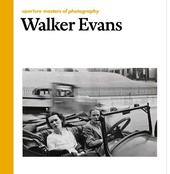
|
Walker Evans: Aperture Masters of Photography
Hardback
Main Details
| Title |
Walker Evans: Aperture Masters of Photography
|
| Authors and Contributors |
By (author) Walker Evans
|
| Series | Masters of Photography |
|---|
| Physical Properties |
| Format:Hardback | | Pages:96 | | Dimensions(mm): Height 203,Width 203 |
|
| Category/Genre | Individual photographers |
|---|
| ISBN/Barcode |
9781597113434
|
| Classifications | Dewey:770.92 |
|---|
| Audience | |
|---|
| Illustrations |
42 duotone images
|
|
Publishing Details |
| Publisher |
Aperture
|
| Imprint |
Aperture
|
| Publication Date |
18 January 2016 |
| Publication Country |
United States
|
Description
Walker Evans helped define documentary photography and is considered one of the most influential artists of the twentieth century. He captured the American experience from the late 1920s to the early 1970s with graceful articulation. From 1935 to 1937, he captured rural America during the Great Depression while working for the Farm Security Administration. Much of Evans' work from that period focused on three share cropping families in the South, culminating in the revolutionary book Let Us Now Praise Famous Men, with text by James Agee (1941). His enduring appreciation for inanimate objects and the vernacular as subject matter is evident in his photographs of shop windows, rural churches, billboards, architecture, and displays of American culture as he saw it. Included in this publication is a new, insightful text by historian David Campany, presenting this definitive work to new audiences. Walker Evans (born in St. Louis, Missouri, 1903; died in New Haven, Connecticut, 1975) was the forerunner of the documentary tradition in American photography and created an unparalleled body of work throughout his life. His renowned work is in permanent collections throughout the world and has been the subject of several retrospectives, including at the Metropolitan Museum of Art and Museum of Modern Art, New York.
Author Biography
Walker Evans did more to expand the art and language of documentary photography than any other photographer, influencing generations of image-makers. He created some of the most memorable images of social and photographic history, and is best-known for his direct, descriptive photographs of vernacular scenes-particularly those of rural America, made during the Great Depression while Evans was working for the Farm Security Administration. His work about three sharecropping families in the South resulted in the groundbreaking book, coauthored with James Agee, Let Us Now Praise Famous Men (1941). Walker Evans did more to expand the art and language of documentary photography than any other photographer, influencing generations of image-makers. He created some of the most memorable images of social and photographic history, and is best-known for his direct, descriptive photographs of vernacular scenes-particularly those of rural America, made during the Great Depression while Evans was working for the Farm Security Administration. His work about three sharecropping families in the South resulted in the groundbreaking book, coauthored with James Agee, Let Us Now Praise Famous Men (1941). David Campany is one of the finest and most accessible writers on photography. He has published several books, among them The Open Road (Aperture, 2014), Walker Evans: The Magazine Work (2013), and Photography and Cinema (2008). He contributes regularly to a range of publications, including Aperture and Frieze, and teaches at the University of Westminster, London. His recent curatorial projects include Walker Evans: Anonymous (Rencontres de la Photographie, Arles, France, 2015) and A Handful of Dust (Le Bal, Paris, 2014).
|